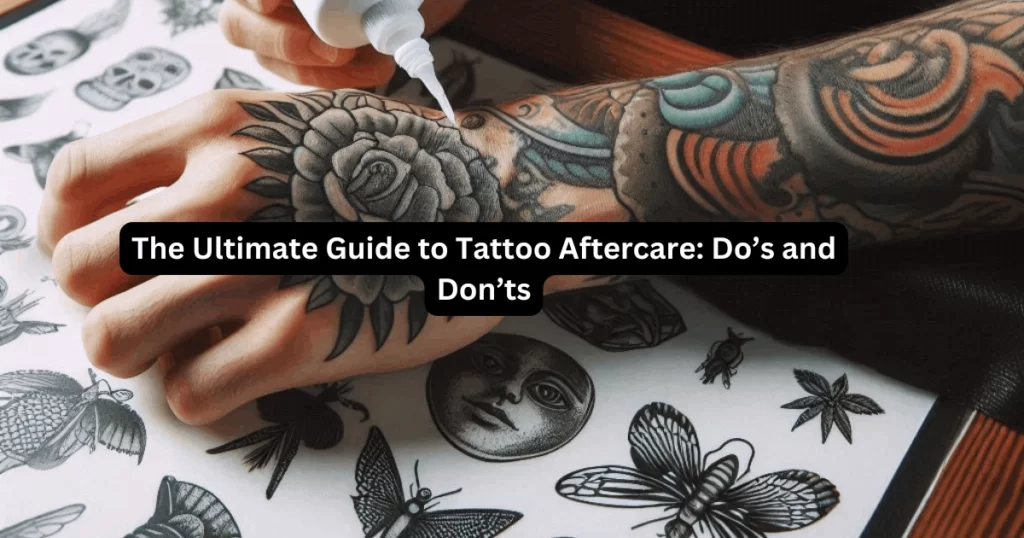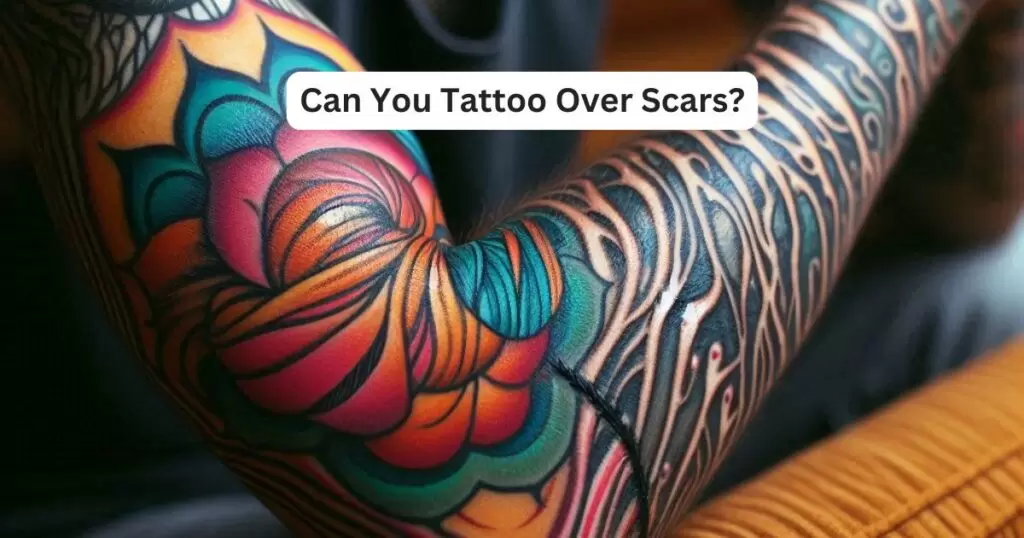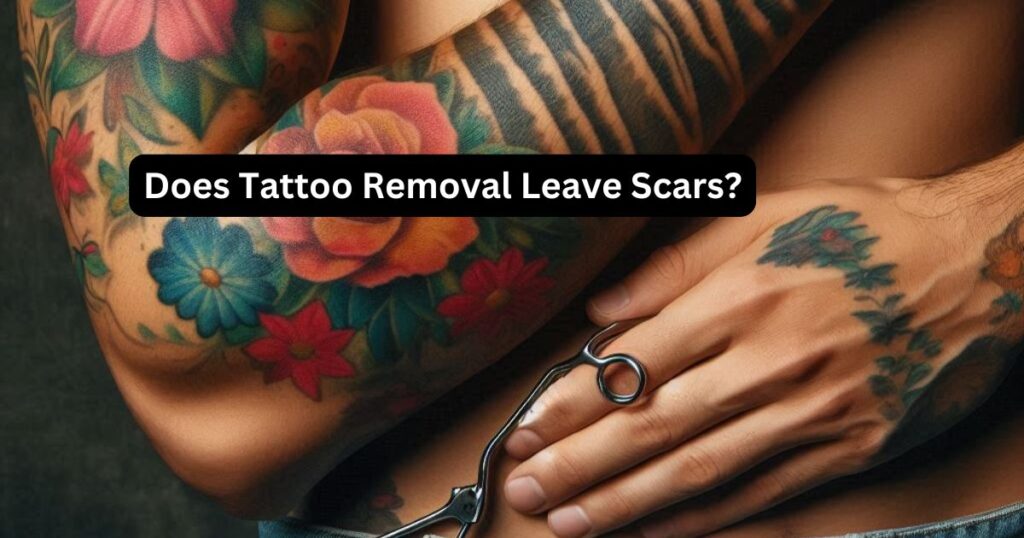Getting a tattoo is a significant commitment. Whether it’s your first or your tenth, proper aftercare is essential to ensure your tattoo heals well and maintains its vibrancy.
The healing process is crucial, and following the right steps can make the difference between a beautifully healed tattoo and one that fades, scars, or becomes infected. This guide outlines the do’s and don’ts of tattoo aftercare to help you protect your new ink.
Tattoo Care First 48 Hours
Do: Listen to Your Tattoo Artist
After your tattoo is complete, your artist will cover it with a bandage or wrap. This protects your fresh ink from bacteria and other contaminants. It’s essential to follow their specific instructions because they know how their technique and the type of ink used will affect healing.
Don’t: Remove the Bandage Too Soon
Your tattoo artist will tell you when to remove the initial bandage. Typically, this is between two to six hours after the tattoo session. Removing it too early exposes your tattoo to airborne bacteria, increasing the risk of infection.
Do: Wash Your Tattoo Gently
Once you remove the bandage, gently wash your tattoo with lukewarm water and a mild, fragrance-free soap. This will clean off any blood, plasma, or ink that has seeped out. Use your fingers, not a washcloth, as it’s gentler on the skin.
Don’t: Soak Your Tattoo
Avoid soaking your tattoo in water. This means no baths, swimming, or hot tubs. Soaking can cause the ink to leach out and may lead to infection. Stick to quick showers and avoid letting the water spray directly on your tattoo.
The First Week: Establishing a Care Routine
Do: Keep Your Tattoo Moisturized
After cleaning your tattoo, apply a thin layer of a fragrance-free, hypoallergenic moisturizer or an aftercare product recommended by your tattoo artist. This keeps the skin hydrated and prevents excessive scabbing. Make sure to apply the moisturizer regularly, but don’t overdo it.
Don’t: Use Heavy Ointments
While it might be tempting to slather on a thick ointment to keep your tattoo moist, this can suffocate the skin and delay healing. Heavy products can also clog pores and cause breakouts around the tattooed area.
Do: Wear Loose Clothing
Tight clothing can rub against your tattoo, causing irritation and possibly removing scabs prematurely. Opt for loose, breathable fabrics that won’t stick to your skin. This is especially important during the first week when your tattoo is most vulnerable.
Don’t: Pick at Scabs or Peeling Skin
As your tattoo heals, you’ll notice it starting to scab and peel. This is a normal part of the healing process. However, picking at scabs or peeling skin can lead to scarring and patchy areas where the ink didn’t set properly. Let your skin heal naturally.
The First Month: Ensuring Proper Healing
Do: Protect Your Tattoo from the Sun
Once your tattoo has healed, it’s crucial to protect it from the sun. UV rays can cause your tattoo to fade significantly. Always apply a high-SPF sunscreen to your tattoo if it’s exposed to sunlight, even after the initial healing period.
Don’t: Expose Your Tattoo to Prolonged Sunlight
Even with sunscreen, it’s best to avoid prolonged sun exposure, especially in the first month. Sunburn on a new tattoo can cause serious damage, leading to fading, blistering, or even infection.
Do: Stay Hydrated
Keeping your skin hydrated from the inside out is just as important as external moisturizing. Drink plenty of water to maintain healthy skin and support the healing process. Hydrated skin is less likely to become dry and itchy as your tattoo heals.
Don’t: Engage in High-Impact Activities
During the first month, avoid activities that might cause your tattoo to stretch or rub excessively. This includes certain exercises or any activity that might lead to excessive sweating, as sweat can irritate the tattooed skin.
Common Tattoo Aftercare Mistakes to Avoid
Using Scented Products
Fragrance and chemicals in scented lotions, soaps, or even laundry detergents can irritate your healing tattoo. Stick to unscented, gentle products to avoid unnecessary irritation.
Over-Moisturizing
While it’s important to keep your tattoo moisturized, overdoing it can be just as harmful as letting it dry out. Applying too much lotion can clog your pores, leading to breakouts and potentially affecting the healing process.
Ignoring Signs of Infection
Redness, swelling, and warmth around the tattoo are normal in the first few days, but if these symptoms worsen or if you notice pus or a foul smell, it could be a sign of infection. Don’t ignore these symptoms. Contact your tattoo artist or a healthcare professional for advice.
Forgetting to Follow Up with Your Tattoo Artist
Aftercare doesn’t end once your tattoo is healed. If you have any concerns or notice areas where the ink didn’t settle well, reach out to your tattoo artist. They might recommend a touch-up session to ensure your tattoo looks its best.
Long-Term Tattoo Care
Do: Keep Moisturizing
Even after your tattoo is fully healed, keeping the skin moisturized will help maintain the vibrancy of the ink. Use a good quality, fragrance-free lotion regularly to keep your tattoo looking fresh.
Don’t: Neglect Your Tattoo Over Time
A tattoo is a lifelong commitment, and proper care doesn’t stop after it heals. Over time, tattoos can fade, especially if exposed to the sun or if the skin becomes dry. Regular moisturizing, sun protection, and avoiding harsh chemicals will help preserve your tattoo’s appearance.
Special Considerations for Different Skin Types
Dry Skin
If you have naturally dry skin, you may need to moisturize more frequently to prevent your tattoo from drying out. Consider using a thicker, but non-comedogenic, moisturizer that provides longer-lasting hydration.
Oily Skin
Those with oily skin should be cautious about over-moisturizing, as this can lead to clogged pores and acne. A lightweight, water-based moisturizer can provide the necessary hydration without exacerbating oiliness.
Sensitive Skin
If you have sensitive skin, it’s important to choose aftercare products that are hypoallergenic and free from harsh chemicals. Patch-test any new product on a small area of your skin before applying it to your tattoo.
Aging Skin
As skin ages, it becomes thinner and less elastic, which can affect the appearance of your tattoo. To keep your tattoo looking its best, continue to moisturize regularly, protect it from the sun, and consider using anti-aging skincare products on the tattooed area.
Enhancing Your Tattoo’s Longevity
Touch-Ups
Over time, all tattoos will fade to some extent. Most tattoo artists offer touch-ups, usually for free within the first year. Touch-ups can refresh the ink and correct any areas that didn’t heal perfectly.
Healthy Lifestyle
Your overall health can affect your tattoo’s appearance. A healthy diet, regular exercise, and not smoking will keep your skin looking vibrant, which in turn helps maintain your tattoo.
Avoiding Abrasive Skincare Products
Exfoliating scrubs, retinoids, and other abrasive skincare products can fade tattoos over time. Be mindful of what you apply to your tattooed skin, especially as it ages.
When to Seek Professional Help
If at any point during the healing process, you notice unusual symptoms, such as extreme redness, swelling, or pain, it’s important to consult with a healthcare professional. Infections can occur, and it’s better to address them early to prevent serious complications.
Tattoo aftercare is crucial to ensuring your tattoo heals properly and remains vibrant for years to come. By following these do’s and don’ts, you can protect your investment and enjoy your tattoo as it becomes a lasting part of your personal story.
—
Taking care of your tattoo is as important as choosing the right design and artist. With proper aftercare, your tattoo can stay vibrant and sharp, a beautiful piece of art that lasts a lifetime. Remember, your tattoo is part of your skin now—treat it with the care and respect it deserves.



